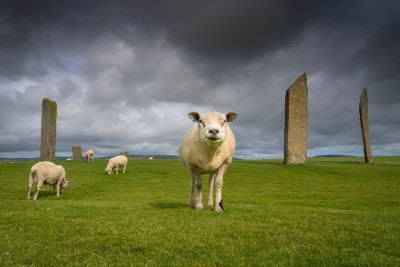Scotland has long been famous for its traditional textiles. Brands such as Harris Tweed® and our famous tartans and woollens are known worldwide. But how can this industry become more sustainable, to respond to the global climate emergency?

Smart thinking
That’s why Zero Waste Scotland, backed by the Scottish Government, has launched a £2 million fund aimed at reducing the environmental impact of textiles in Scotland. Zero Waste Scotland are a not-for-profit environmental organisation that exist to inform and motivate Scotland to use products and resources responsibly.
The organisation estimates that clothes and textiles have a high carbon cost due to the energy needed to manufacture and transport them. So while textiles make up just 4% of waste by weight, they account for 32% of the carbon impact of Scotland's household waste.
The fund is designed to boost Scotland's circular economy and help us reach our net zero targets.
Zero Waste Scotland chief executive Iain Gulland said: "As a nation, we need to rethink the way we make, buy, and use products and take action to consume more responsibly.
"Businesses have a key role to play in facilitating that shift, helping customers make more sustainable purchasing decisions while also contributing to a greener economy.”

Baa-baa green sheep
The good news is that wool – central to the production of our iconic tartans and tweeds – is already one of the greenest fibres on the planet. If well looked after can last years, or be rewoven into new products. And Scotland has no shortage of sheep.
While innovative designers such as Prickly Thistle who are the only B Corp certified textiles mill and clothing manufacturer – are leading the circular economy charge, older, more established brands are also changing the way they work.
Johnstons of Elgin, who have worked with natural, renewable, biodegradable fibres since 1797, know a thing or two about high-quality cashmere and woollen products. They recently appointed circular economy specialist Iain Findlay to further ‘green’ their production processes. Already a winner of the Queen's Award for Enterprise, for their work on sustainability, Johnstons looks at every input and output from their production processes.

The need for Tweed!
Meanwhile, in the Outer Hebrides, traditional Harris Tweed® is hand woven on a treadle loom at each weaver’s home on the Isle of Lewis, not at a mill. This is a proper, hand-spun product, reflecting the colours and textures of the islands.
Non-allergenic and biodegradable, the wool is dyed before being spun as opposed to dying the yarn, to create a myriad of intricate shades and hues. The tweed is then returned to the mill to be finished, with the independent Harris Tweed Authority and the Orb Trademark applied as the ultimate seal of provenance and quality. Only then can it be called Harris Tweed®.
Long a favourite with high-end designers, this most humble of fabrics – made to face the worst weather the islands can throw at it - has featured in everything from catwalk creations to expensive sports shoes.
Thinking big
It’s not only in the world of fashion that Scotland is rethinking the way we make, use, and recycle textiles. In March this year, with the help of Scottish Enterprise, family-run commercial textile manufacturing business, The Beal Group, completed an ambitious relocation and expansion project allowing for diversification into net zero business growth opportunities.
At their new £4 million plant, near Glasgow, the company is diversifying to introduce new eco-friendly product lines, including manufacturing sustainable re-useable covers which will replace the use of shrink wrap plastic commonly used in modular construction projects nationwide.
Their new product range also includes protective reusable packaging products for the food, transport, engineering, and industrial sectors.
Find out more
In 2021 Glasgow hosted COP26, where Scotland was able to showcase some of our innovative sustainable practices and lead global conversations on tackling the climate emergency in a way that is equal, fair and creates new opportunities. Waste going to landfill in Scotland is the lowest since records began and the zero waste, circular economy practices that are being implemented across Scotland’s fashion and textiles industry are just a small fraction of the ways Scotland is going net zero.
There are multiple sources of financial support for the fashion and textile businesses in Scotland. See - Funding for Scotland - UKFT – to discover how we can help you weave a greener and more sustainable business in Scotland.